Yang Langlang: School Principal Secures Wonderful Childhood for Every Student
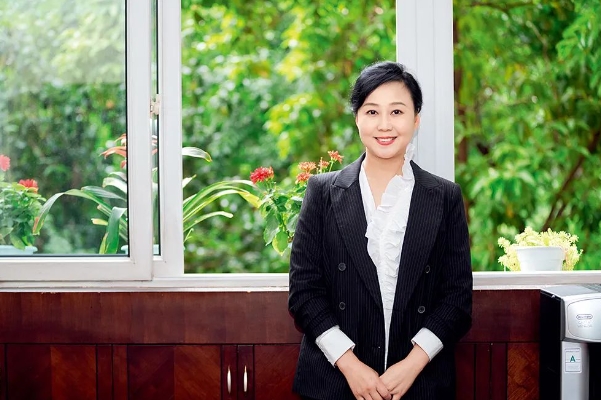
Yang Langlang is secretary of the Party (Communist Party of China) committee and principal of Chongqing Renmin Primary School. Yang has said education is a lifelong career, and she has vowed to spend all of her time guiding students, to ensure they take every step steadily. "Giving students a wonderful childhood here" is the concept Yang highlights in her management of the school. She hopes every child will grow up in the best way for himself or herself.
Yang has led her team in creating a comprehensive curriculum system that highlights personal experience and openness. The system, which includes compulsory/optional courses, social-service courses and courses for students' groups, is a demonstrative approach for the development of elementary education. In 2015, Principal Yang Langlang's Studio was established, as one of the first group of national outstanding school principals' studios designated by the Ministry of Education. The studios were established to help train school principals across the country.
Treating Students with Love
Yang grew up in a family of intellectuals. "My parents like reading. They subscribed to several newspapers and magazines for me to read, in my spare time. They were both teachers, and we communicated with each other like friends. When I became a primary school teacher, they were happy," says Yang.
In 1993, after she graduated from university, Yang was recommended for a job, as an English teacher, at Chongqing Renmin Primary School. That was the first year that primary schools in Chongqing had English classes as part of the curriculum. The school, established in 1945 in north China's Hebei Province, had revolutionary traditions. It served children of military officers, and it was dubbed as a "cradle on horseback."
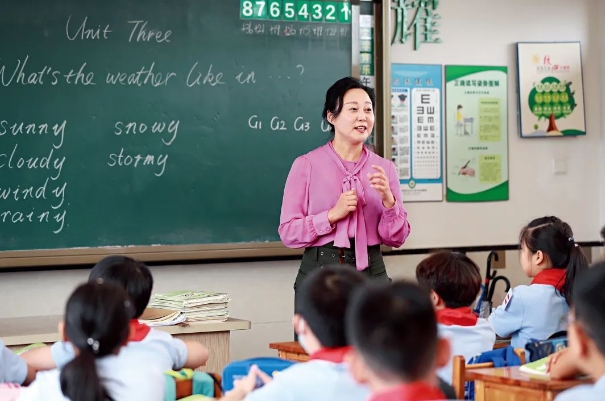
While most Chinese who studied English during the 1990s wanted to work in foreign-owned enterprises, Yang chose to become a teacher. She still remembers what her mother said to her on her first day as a teacher: "Being a teacher means you should treat students like parents treat their children. You must be serious in work."
Yang's career didn't start smoothly. Why? She was the only English teacher in the school. While teachers of other subjects prepared for their classes together, she had to prepare for her class alone. She decided to try various teaching methods to make her class interesting. She prepared for the class, taught once a week, carefully. In each class, after she finished teaching from the textbook, Yang would either tell stories that reflected European and American culture, or she would organize the students to play games. She even took her students to fast-food restaurants, to help them practice their oral English.
"I would order some food if the students could speak the English words for the food correctly. Thus, the children were enthusiastic in remembering the words and grammar, and they liked having English class. A good teacher must try hard to remain as curious as the children," Yang recalls.
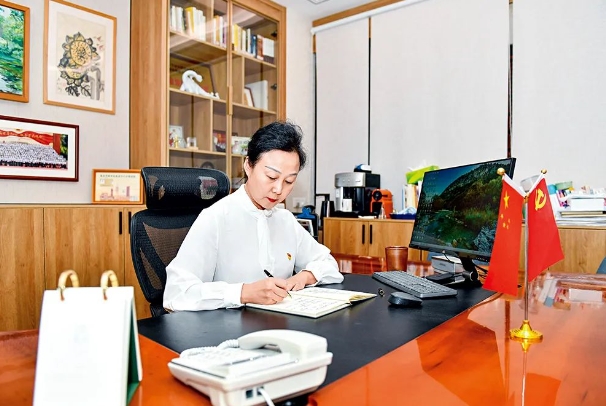
Good Environment
Given Yang's hard work and excellent teaching ability, the school gradually built up its Englishteaching team, and Yang became head of the team. She often led teachers in researching methods of preparing for and teaching English classes. The school has won many contests, at the district, city and national levels, for its English classes. Yang in 1998 was the leader who established the school's International Department — the first of its kind in Chongqing.
In 2009, Yang, then 37, was appointed principal of Chongqing Renmin Primary School. "The establishment of the school embodied the Party's care for education, and my predecessors left their ideals regarding education here. We must carry forward the 'red spirit'," Yang says. Under her leadership, the school has designated two classes that highlight patriotism and the revolutionary spirit. The school has also created a brand for moral education of minors. The school has implemented several educational programs that combine revolutionary traditions with the spirit of the new era.
To create a beautiful environment in the school, Yang has made many creative designs for various areas of the campus, including decorating teachers' offices, creating a small, jungle-like garden, and establishing a small courtyard beside the library. "The school should be a place that children love. We will be happy if students enjoy themselves here," Yang says.
Yang believes education should allow students to have different personalities and talents. Children learn how to read and write, but, more importantly, they should learn to be grateful and creative, she believes. Students, she adds, should have the ability to learn and live their everyday lives, and they should be responsible for the happiness of themselves and their families. Also, she continues, they should do their part to promote the prosperity of the country.
Every year, Chongqing Renmin Primary School organizes activities, such as sports and art festivals, based on students' needs and interests. The school holds a forum every two years. During the forum, philosophers, zoologists, poets and book designers share their ideas with the students. The school also organizes students to walk around Chongqing, to learn about the city.
In the school, a math class may integrate elements of English, music and even art classes. Students who have an interest in the performing arts can tell their childhood stories through singing, role playing and dancing on the stage of the school's theater.
"Educators should respect children's nature. They should pay attention to children's personalities and dreams, and help each child find the unique path of development. Teachers should care for each child's growth. Like cultivating plants, a teacher's job is to provide soil, temperature, light and water, based on the difference of each seed, and then wait for the seeds to grow up," Yang says.
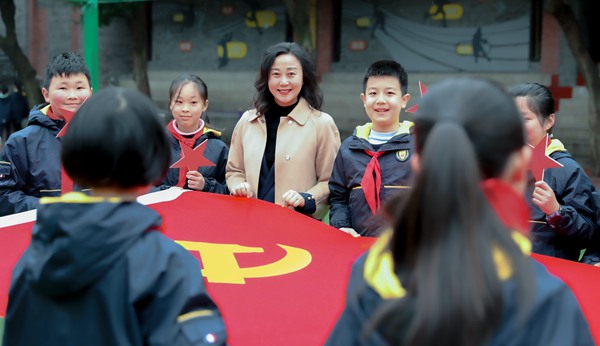
Teachers' Personalities
Yang has shared her teaching experiences unreservedly with her colleagues, and she has cultivated many outstanding English teachers. "Actually, every teacher has the potential to excel … and outstanding teachers often have unique personalities. Schools should be more tolerant of young teachers, so the teachers can be constant drivers for schools' development," Yang says.
Teachers' talents and hobbies can be the sources of curriculum development, she adds. In Chongqing Renmin Primary School, some of the teachers provide afternoon tea, during English classes, to help students learn about food culture and table manners in Western countries. Some of the teachers are good at organizing activities, for students' groups, and others offer classes in film appreciation.
Yang has done various things to provide young teachers with opportunities to improve cross-disciplinary capacity. She has invited experts, from the fields of art, science and philosophy, to lead discussions with teachers about education. The discussions have helped teachers understand the essence of education, and to integrate knowledge of different subjects into their classes.
Children are often divergent thinkers. For example, many students learn the Chinese poem, Viewing the Waterfall at Mount Lu: "Flying waters descending straight three thousand feet, Till I think the Milky Way has tumbled from the ninth height of Heaven." As the students are learning the poem during Chinese language class, they may ask their teacher how tall the waterfall is, and/or what the Milky Way is. Some teachers, who use traditional teaching methods, may suggest such questions should be answered by the math teacher.
"Parrying children's questions will curb their curiosity. In curriculum reform, we should think about how to promote students' development in a proper way. A Chinese-language teacher should be prepared to answer students' questions concerning knowledge of geography and astronomy," says Yang.
Cross-disciplinary teaching can make teachers more energetic in their work, and can help them improve capacity. A math teacher once told Yang that through cross-disciplinary discussions with art and English teachers, he recognized more possibilities for teaching math, and that made him more passionate about teaching. "We will try to help every teacher find the suitable stage for his/her development," Yang says. She hopes every teacher in her school will achieve contentment, fulfillment and honor from his/her teaching career.
Chongqing Renmin Primary School has been designated a national outstanding school with civility, a national outstanding primary school with unique characteristics, and a national outstanding unit in science and technology education.
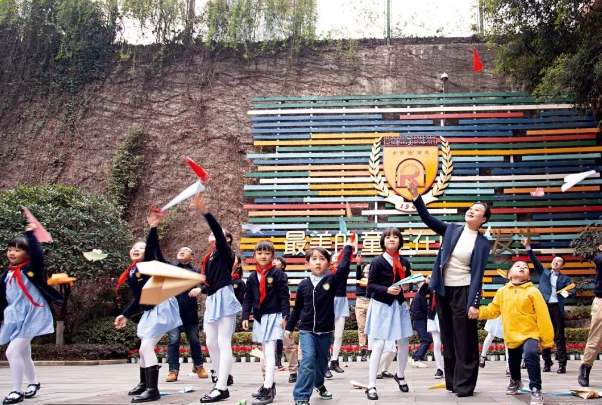
Social Responsibilities
In Yang's opinion, Chongqing Renmin Primary School, established during wartime, bears the responsibility of cultivating talents, for society, in the new historical period. Yang is responsible for promoting the school's sound development, and she has the obligation of promoting the common development of other schools, especially with the concepts on which her school is run.
The school has partnered with many other schools, including leading primary schools in towns, in areas with large ethnic-minority populations, and in remote mountainous areas. It has offered assistance to more than 100 county- or village-level schools in Chongqing. The school began working with Shaxi Primary School, in Wuxi County in Chongqing, in 2016. Shaxi Primary School is a boarding school in a mountainous area. After she witnessed the poor living conditions of the students, Yang donated beds to the school, and she contacted the county's government, and some warmhearted people, to get more support for the school. The school's conditions and quality of education have since improved.
Based on the differences in the states of development of partner schools, Yang has led teachers from her school in conducting research and making and implementing specific plans to assist other schools. They have helped the schools train teachers, improve culture in the schools, organize activities with local features, and improve the level of scientific research. "I think assistance in education should be a long-lasting process. During the process, we can see our weak points," Yang says.
In recent years, Yang has developed and evolved the idea of building an education-oriented "circle of friends." She hopes her school will play a role in regional education in Chongqing, and that the school will help schools progress in Chongqing's remote areas. She also looks forward to communicating and cooperating with schools in other regions of China, and even from other countries.
Photos Supplied by Interviewee
(Women of China English Monthly September 2023 issue)
Please understand that womenofchina.cn,a non-profit, information-communication website, cannot reach every writer before using articles and images. For copyright issues, please contact us by emailing: website@womenofchina.cn. The articles published and opinions expressed on this website represent the opinions of writers and are not necessarily shared by womenofchina.cn.

 京公网安备 11010102004314号
京公网安备 11010102004314号